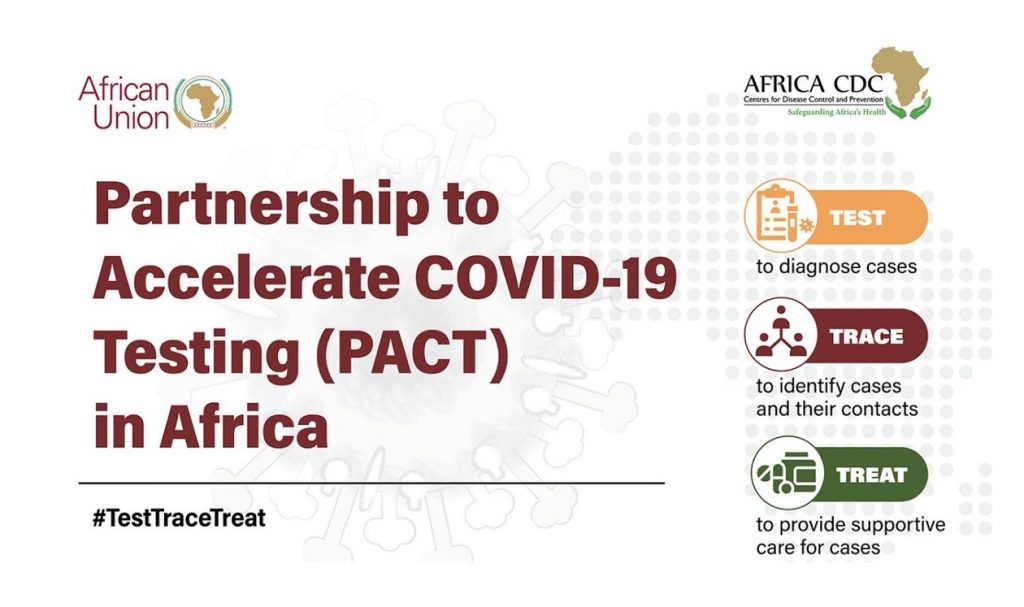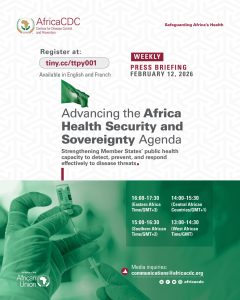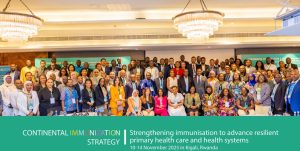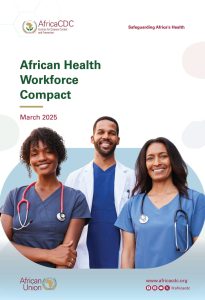The African Union Joint Continental Strategy for COVID-19 endorsed by Africa Health Ministers and the Bureau of Heads of State and Governments of the African Union aims to implement well-coordinated actions and strong partnerships to strengthen the effectiveness of COVID-19 response across Africa. To continue to combat COVID-19 in 2022, the Africa CDC will focus its efforts to supporting member states in four priority areas: a) scale-up of vaccination, b) advance COVID-19 rapid antigen Self-Testing, c) ensure access to COVID-19 treatment, and c) promote public health and social measures.
In 2020, the African Union (AU)/Africa CDC launched the Partnership to Accelerate COVID-19 Testing (PACT). As of 4 February 2022, more than 95.5 million tests have been carried out and more than 10.8 million cases of COVID-19 have been detected in AU Member States, representing 3% of all cases globally[1]. According to WHO Regional Office for Africa, 85% of COVID-19 cases remain undetected in Africa[2]. Despite all the efforts to scale-up COVID-19 testing in Member States including wider use of rapid antigen diagnostic tests (RDTs), accessibility of diagnostic testing still remains an area for improvement. Furthermore, the recently emerged and rapidly transmissible Omicron variant[3] could make the situation more challenging. As with asymptomatic infections, the mild symptoms from infection by variants of concern such as Omicron may further contribute to an increase in the number of infected people who do not seek testing and/or medical attention. There is therefore; a need to intensify COVID-19 testing in AU Member States using all existing testing approaches, including introduction of rapid antigen self- testing. Access to self-testing can improve the detection of asymptomatic and mildly symptomatic cases and increase the current coverage of the COVID-19 testing with linkage to treatment and self-isolation.
Self-testing as adopted from the WHO guidelines for HIV self-testing and partner notification (2016), is a process whereby a person collects their own specimen from their body using a simple device and uses that specimen to perform a diagnostic test and interprets the results usually in a setting, either alone or with a person they trust[4]. In the case of COVID-19 self-testing, this process involves an individual using approved SARS-CoV-2 In vitro diagnostic kits and devices to privately collect their own sample and perform a COVID-19 antigen rapid diagnostic test (Ag-RDT).
Advantages of Self-Testing
Like point-of-care (POC) COVID-19 Ag-RDTs, COVID-19 Ag self-tests have many advantages: a) ease of use, b) short turnaround time, and c) lower cost compared to Nucleic Acid Amplification Test (NAAT), ultimately allowing widespread utilization of COVID-19 testing in Member States. Moreover, the COVID-19 Ag self-tests allow for even greater decentralization of testing away from testing centers or facilities, including the convenience of at-home testing.
Many of COVID-19 Ag-RDT kits for professional use are simple and reliable, but they are not applicable for a home testing strategy due to their sampling strategy (most require nasopharyngeal or oropharyngeal specimens). Recently COVID-19 Ag self-tests that use nasal swabs have received regulatory approvals and are available in the market.
Potential benefits of Self-Testing
Self-tests allow individuals to obtain a rapid result, thereby enhancing the early detection, self-isolation, and treatment of infected individuals, which in turn is essential for the pandemic control. From a public health perspective, COVID-19 Ag self-tests can conveniently complement POC tests by allowing wider access to testing throughout the country. COVID-19 Ag self-testing overcomes the downside of POC Ag-RDTs, which may include a high burden on health workers; limited access by individuals who would otherwise get the service within the confinement and convenience of their privacy; delayed diagnosis from suspected onset of COVID-19 symptoms; increased travel costs incurred to reach centralized testing; and risks of further exposure as people gather at testing facilities.
The AU/Africa CDC recommends the implementation of COVID-19 Ag self-testing in AU Member States as an adjunct strategy to improve access to COVID-19 testing. Africa CDC working through the continental laboratory technical working group will publish interim guideline on the use of COVID-19 Ag self-testing very soon. Based on lessons learned from self-testing for other diseases, the COVID-19 Ag self-test, will be critical in fighting the current pandemic.
The AU/Africa CDC is launching the “Know your COVID-19 Status Initiative” as part of the Partnership to Advance COVID-19 Testing by scaling up Rapid Antigen Self-Testing
[1] Coronavirus Disease 2019 (COVID-19) – Africa CDC
[2] Six in seven COVID-19 infections go undetected in Africa | WHO | Regional Office for Africa
[3] Science Brief: Omicron (B.1.1.529) Variant | CDC
[4] 2016 WHO guidelines for HIV self-testing and partner notification







